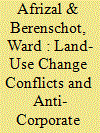| Srl | Item |
| 1 |
ID:
169737


|
|
|
|
|
| Summary/Abstract |
Ethanol biofuel demand in Brazil is highly dependent on macroeconomic and policy drivers, making it difficult to anticipate future production and associated environmental implications. Here we develop scenarios of ethanol demand in Brazil towards 2030, based on a thorough examination of key influencing drivers, i.e. GDP and population growth, fleet composition, blending policies, fuel prices and energy efficiency. We then estimate their land-use implications using a detailed partial equilibrium model, GLOBIOM-Brazil. We find that ethanol demand is highly sensitive to the drivers considered and could increase between 37.4 and 70.7 billion litres in 2030 depending on the scenario. Such increase is 13% and 114% above the 2018 production. This represents an expansion in sugarcane area between 1.2 and 5 million hectares (14%–58% above the land-use in 2018). Compared to the low demand scenario, a high demand for ethanol in 2030 would drive sugarcane expansion mostly into pastureland (72%) and natural vegetation mosaics (19%). Our results suggest that future ethanol demand in Brazil should not substantially affect food production nor native forest. This outcome will however depend on the compliance with the sugarcane agro-ecological zoning (AEZ) by the ethanol sector in Brazil, a key assumption of our projections.
|
|
|
|
|
|
|
|
|
|
|
|
|
|
|
|
| 2 |
ID:
186568


|
|
|
|
|
| Summary/Abstract |
While processes of land-use change have triggered conflicts across Asia, our knowledge of the responses of affected communities is largely based on case-studies. This review essay addresses this challenge by reviewing and synthesizing 49 studies of conflicts between rural communities and companies in order to identify salient characteristics of anti-corporate activism in Indonesia. We find that, in contrast to the ‘rightful resistance’ observed elsewhere, the strategies employed by rural communities in Indonesia are remarkably “rightless” as both their discourse and their conflict resolution efforts are marked by a remarkable irrelevance of laws, regulations and courts. Communities frame their claims mostly in terms of customary laws while largely relying on informal mediation by local authorities. We attribute this “rightless” character of land-use change conflicts to the weak legal protection of land rights in Indonesia and the relative powerlessness of communities in the face of collusion between authorities and companies.
|
|
|
|
|
|
|
|
|
|
|
|
|
|
|
|
| 3 |
ID:
175908


|
|
|
|
|
| Summary/Abstract |
Increasing biofuel production over the last decade and biofuel policies in Brazil, the European Union, and the United States have changed the global agricultural landscape in terms of land-use, commodity prices, and trade. Increasing fuel efficiency and electrification of the vehicle stock is projected to lower gasoline, diesel, and biofuel demand in the future. In this analysis, we quantify the effects of a 30% reduction in ethanol consumption in the U.S. and the European Union triggered by higher vehicle fleet fuel efficiency on global agricultural markets. Our results show decreases in global commodity prices by 1.9%–6.6% and a slight decrease in global cropland by 0.3%. Major changes occur in trade patterns with U.S. corn exports increasing by 30.3%. Global greenhouse gas emissions are lower due to the overall reduction in cropland. Gasoline and diesel consumption of the vehicle fleet is not changing rapidly but is a long-term process because vehicles are on average in operation for 10 or more years. Consequently, there are important long-term policy implications from changes in fuel efficiency requirements or ethanol blending limits that affect commodity prices, trade, and greenhouse gas emissions.
|
|
|
|
|
|
|
|
|
|
|
|
|
|
|
|